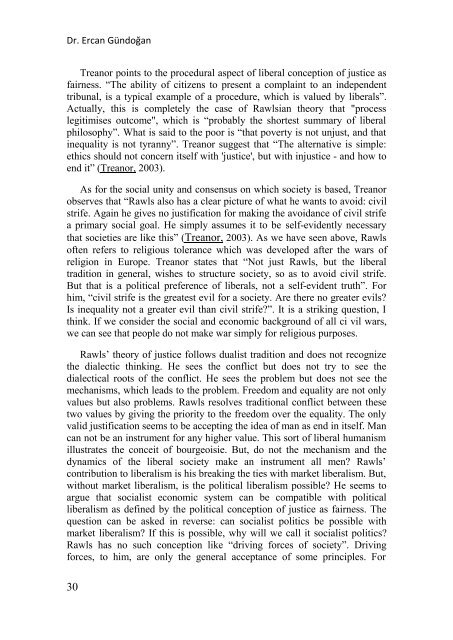SEEU Review vol. 5 Nr. 2 (pdf) - South East European University
SEEU Review vol. 5 Nr. 2 (pdf) - South East European University
SEEU Review vol. 5 Nr. 2 (pdf) - South East European University
You also want an ePaper? Increase the reach of your titles
YUMPU automatically turns print PDFs into web optimized ePapers that Google loves.
Dr. Ercan Gündoğan<br />
Treanor points to the procedural aspect of liberal conception of justice as<br />
fairness. “The ability of citizens to present a complaint to an independent<br />
tribunal, is a typical example of a procedure, which is valued by liberals”.<br />
Actually, this is completely the case of Rawlsian theory that "process<br />
legitimises outcome", which is “probably the shortest summary of liberal<br />
philosophy”. What is said to the poor is “that poverty is not unjust, and that<br />
inequality is not tyranny”. Treanor suggest that “The alternative is simple:<br />
ethics should not concern itself with 'justice', but with injustice - and how to<br />
end it” (Treanor, 2003).<br />
As for the social unity and consensus on which society is based, Treanor<br />
observes that “Rawls also has a clear picture of what he wants to avoid: civil<br />
strife. Again he gives no justification for making the avoidance of civil strife<br />
a primary social goal. He simply assumes it to be self-evidently necessary<br />
that societies are like this” (Treanor, 2003). As we have seen above, Rawls<br />
often refers to religious tolerance which was developed after the wars of<br />
religion in Europe. Treanor states that “Not just Rawls, but the liberal<br />
tradition in general, wishes to structure society, so as to avoid civil strife.<br />
But that is a political preference of liberals, not a self-evident truth”. For<br />
him, “civil strife is the greatest evil for a society. Are there no greater evils?<br />
Is inequality not a greater evil than civil strife?”. It is a striking question, I<br />
think. If we consider the social and economic background of all ci vil wars,<br />
we can see that people do not make war simply for religious purposes.<br />
Rawls’ theory of justice follows dualist tradition and does not recognize<br />
the dialectic thinking. He sees the conflict but does not try to see the<br />
dialectical roots of the conflict. He sees the problem but does not see the<br />
mechanisms, which leads to the problem. Freedom and equality are not only<br />
values but also problems. Rawls resolves traditional conflict between these<br />
two values by giving the priority to the freedom over the equality. The only<br />
valid justification seems to be accepting the idea of man as end in itself. Man<br />
can not be an instrument for any higher value. This sort of liberal humanism<br />
illustrates the conceit of bourgeoisie. But, do not the mechanism and the<br />
dynamics of the liberal society make an instrument all men? Rawls’<br />
contribution to liberalism is his breaking the ties with market liberalism. But,<br />
without market liberalism, is the political liberalism possible? He seems to<br />
argue that socialist economic system can be compatible with political<br />
liberalism as defined by the political conception of justice as fairness. The<br />
question can be asked in reverse: can socialist politics be possible with<br />
market liberalism? If this is possible, why will we call it socialist politics?<br />
Rawls has no such conception like “driving forces of society”. Driving<br />
forces, to him, are only the general acceptance of some principles. For<br />
30

















